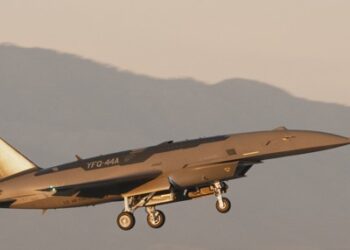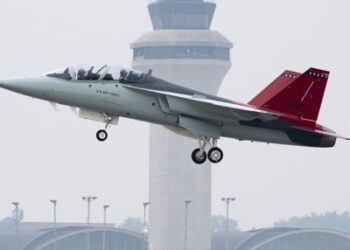As defense spending increases in the U.S. and abroad, some defense firms are investing in “self-funded” prototypes. This practice, while not new, is gaining renewed focus, particularly among companies new to defense and prime contractors seeking to address emerging threats proactively.
Lockheed Martin’s CEO, James Taiclet, highlighted during the company’s earnings call that they are in the final phase of a five-year shift in their research and development strategy. This shift emphasizes corporate-level initiatives, including the development of autonomous Black Hawks and space-based interceptors for the Trump administration’s proposed Golden Dome initiative. Taiclet stated, “We are building prototypes, full up operational prototypes… These are real devices that will work and that can be produced at scale.” He confirmed plans for a “real on-orbit space-based interceptor demonstration” by 2028.
Lockheed Martin aims to submit proposals for space-based interceptors, focusing on building prototypes that function reliably and can be produced at scale. Taiclet noted the company is pivoting to self-fund prototypes and intends to continue responding to Requests for Proposals (RFPs) and Requests for Information (RFIs) in traditional ways.
Over the last two years, Northrop Grumman has invested over $2 billion in its independent research and development (IRAD) to accelerate technology market entry, particularly as international sales rise. CEO Kathy Warden stated that the company is focusing on priority areas, such as multi-function sensors, AI integration in solutions, and developing advanced weapon systems. The demand from allied nations for enhanced air and missile defense capabilities has contributed to a significant increase in international sales, which grew by 20 percent year-to-date.
The Pentagon’s increased research and development funding in recent years has not solved the fundamental issue of effectively fielding prototypes and converting them into programs of record. The process can take approximately 12 years, which has led some emerging defense companies to fund their technology development independently, allowing them to prove their capabilities before contracts materialize.
Apex, a Los Angeles-based manufacturing startup, plans to launch a prototype for a platform essential for space-based interceptors by the next summer. CEO Ian Cinnamon mentioned that Apex aims to develop the Orbital Magazine technology privately, moving quickly without waiting for government contracts.
Cinnamon emphasized the significant risks involved, including the considerable financial investment and the timeline needed for the underlying technology. In contrast to traditional Pentagon-funded programs that often stagnate after initial R&D funding, new defense companies are disrupting this cycle by building prototypes without formal DOD requirements.
The Center for a New American Security (CNAS) reports that while research and development costs grow, procurement spending remains stagnant, resulting in many prototypes not entering full-scale production. Successful programs often fail to transition into effective procurement numbers, as shown by examples like the Constellation-class frigate and the upgraded F-35.
Companies such as Textron are working closely with military operators to directly showcase technologies. Textron CEO Scott Donnelly remarked on the importance of their unmanned offerings, even after the Army canceled key programs like Future Tactical Unmanned Aerial Systems (FTUAS). Donnelly expressed optimism, emphasizing plans to directly provide these systems to brigade units to meet the demand for Intelligence, Surveillance, and Reconnaissance (ISR) capabilities.













